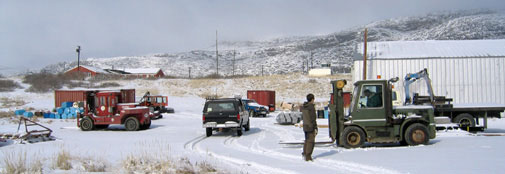Beginning of the field season 2015

This year, we are looking forward to two exciting field campaigns in Greenland.
On the East Greenland Renland ice cap, a team will aim to retrieve an intermediate-depth ice core covering approx. the last 100,000 years.
Another team will undertake a traverse on the ice sheet, moving our deep ice core drilling camp from the site of the former NEEM project to the new EastGRIP project site further to the North-East on the Greenland ice sheet, and taking measurements along the way.
On April 20th, the first team arrives in Kangerlussuaq to open the field office, and during the following week, the teams will gather and pack their equipment before continuing to the field camps.
Daily reports will be available online here at the NEEM Field Diaries and at RECAP webpage once the field camps are open and operational. Furthermore you will be able to follow the traverse via Twitter, NEEM_to_EGRIP.
The EastGRIP project
Ice streams export enormous amounts of ice from the ice sheets to the ocean, and are therefore key factors for understanding the response of ice sheets to climate change and predicting future sea level rise.
Still, little is known about what controls the dynamics of ice streams. The EastGRIP ice core will be drilled through the North-East Greenland Ice Stream, providing new information about how ice streams develop, and will provide a detailed climate record of the last glacial-interglacial cycle.
EGRIPs main focus 2015
The focus of the 2015 field season is moving vehicles, buildings, and equipment from the site of the former project NEEM to the new site, and establishing the airstrip and other essential infrastructure. The ice coring will start in 2016.
The Renland project
Climatic conditions on the Renland ice cap are strongly influenced by the varying Arctic sea ice export along Greenland’s east coast. An ice core from the Renland ice cap is thus perfectly suited for obtaining information on Eastern Greenland climatic conditions including the export of sea ice from the Arctic Ocean.
The REnland ice CAP project (RECAP) aims to recover an approx. 500 m long ice core through the Renland ice cap, providing a climate and sea-ice records for the past 100,000 years.
| Next entry → |

